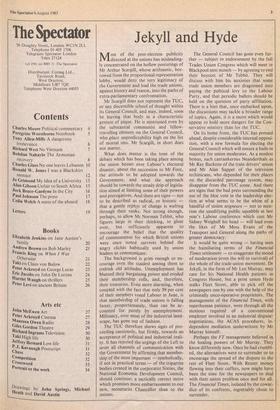Jekyll and Hyde
Most of the post-election publicity directed at the unions has misleading- ly concentrated on the hollow posturings of Mr Arthur Scargill, whose arithmetic, bor- rowed from the proportional representation lobby, would deny the very legitimacy of the Government and lead the trade unions, against history and reason, into the paths of extra-parliamentary confrontation.
Mr Scargill does not represent the TUC, or any discernible school of thought within its General Council, and may, indeed, soon be leaving that body in a characteristic gesture of pique. He is mistrusted even by the substantial communist and fellow- travelling element on the General Council, who place unpredictability high on the list of mortal sins. Mr Scargill, in short does not matter.
What does matter is the tone of the debate which has been taking place among the union bosses over Labour's electoral disaster, about the succession to Mr Foot, the attitude to be adopted towards the Government, and what the approach should be towards the steady drip of legisla- tion aimed at limiting some of their powers and prerogatives. And there are signs — not to be described as radical, or historic that a gentle zephyr of change is wafting through their ranks. Not strong enough, perhaps, to allow Mr Norman Tebbit, who figures large in their thinking, to gloat over, but sufficiently apparent to encourage the belief that the quality of commonsense for which British unions were once noted survives behind the angry clichés habitually used by union leaders to communicate.
The background is grim enough to en- courage even the staidest among them to rethink old attitudes. Unemployment has blunted their bargaining power and eroded their membership rolls, and, therefore, their treasuries. Even more alarming, when coupled with the fact that only 39 per cent of their members voted Labour in June, is that membership of trade unions is falling faster, proportionately, than can be ac- counted for purely by unemployment. Militancy, over most of the industrial land- scape, has gone out of fashion.
The TUC therefore shows signs of pro- ceeding cautiously, but firmly, towards an acceptance of political and industrial reali- ty. It has rejected the urgings of the Left to sever all channels of communication with the Government by affirming that member- ship of the most important — symbolically, if not in practical terms — of the tripartite bodies created in the corporatist Sixties, the National Economic Development Council, should continue: a tactically correct move which promises more embarrassment to our new, monetarist Chancellor than to the unions.
The General Council has gone even fur- ther — subject to endorsement by the full Trades Union Congress which will meet in Blackpool next month — by agreeing to end their boycott of Mr Tebbit. They will discuss with him his anxieties that some trade union members are dragooned into paying the political levy to the Labour Party, and that periodic ballots should be held on the question of party affiliation. There is a hint that, once embarked upon, the discussions may tackle a broader range of topics. Again, it is a move which would appear to hold more dangers for the Con- servative ministry than for the TUC.
On its home front, the TUC has pressed ahead, despite considerable internal opposi- tion, with a new formula for electing the General Council which will ensure a built-in majority for union moderates. As a modest bonus, such cantankerous Neanderthals as Mr Ray Buckton of the train drivers' union and Mr Alan Sapper of the television techinicans, who depended for their places on the discarded patronage system, may disappear from the TUC scene. And there are signs that the bad press surrounding the use of the bloc vote in the leadership elec- tion at what seems to be the whim of a handful of union seigneurs — not to men- tion the unedifying public squabble at last year's Labour conference which cost Mr Sidney Weighell his head — will lead even the likes of Mr Moss Evans of the Transport and General along the paths of greater democracy.
It would be quite wrong — having seen the humiliating terms of the Financial Times settlement — to exaggerate the mood of moderation (even the will to survival) of the whole of the trade union movement. Dr Jekyll, in the form of Mr Len Murray, may care for his National Health patients in Congress House, but a print union Hyde stalks Fleet Street, able to pick off the newspapers one by one with the help of the criminally unco-operative proprietors. The management of the Financial Times, with superhuman patience, went through all the motions required of a conventional employer involved in an industrial dispute: negotiations, the ACAS procedures, in- dependent mediation underwritten by Mr Murray himself.
Perhaps the FT management believed in the healing powers of Mr Murray. They know differently now. Once he had crumbl- ed, the alternatives were to surrender or to encourage the spread of the dispute to the rest of Fleet Street. With Reuter money flowing into their coffers, now might have been the time for the newspapers to deal with their union problem once and for all. The Financial Times, isolated by the cowar- dice of its confreres, regrettably chose to surrender.






































 Previous page
Previous page